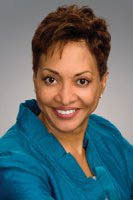Prize-winning Journalist to Deliver MLK Banquet Speech
- January 8th, 2013
- in News
CCBP Graduate Assistant
 TUSCALOOSA — Cynthia Tucker knows firsthand why it’s important to remember the legacy of Dr. Martin Luther King Jr., who pastored a church 100 miles away in Montgomery, Ala., when she was growing up in Monroeville.
TUSCALOOSA — Cynthia Tucker knows firsthand why it’s important to remember the legacy of Dr. Martin Luther King Jr., who pastored a church 100 miles away in Montgomery, Ala., when she was growing up in Monroeville.
Tucker, who won a Pulitzer Prize as editorial page editor of the Atlanta Journal-Constitution, will be the banquet speaker for the 24th Annual Martin Luther King, Jr. Realizing the Dream celebration, on Friday, Jan. 18 at 6:30 p.m. at the Hotel Capstone.
Born in Monroeville, Ala., the Auburn University graduate is the Charlayne Hunter-Gault Distinguished Writer-in-Residence in the Grady College of Journalism and Mass Communication at the University of Georgia. Hunter-Gault, a distinguished journalist with National Public Radio and The New York Times, became the first black female to enroll at the University of Georgia in 1961.
It was 1955, the turbulent year of the bus boycott of the segregated Montgomery Transit System. Tucker was born on March 13. “We lived close to Montgomery and even closer to Selma,” Tucker said. “I grew up watching the national news accounts with my parents. So, as a kid I was very much aware of what was going on and that it would make a big difference in my life.”
Both of Tucker’s parents were educators. She recalls how John Tucker, a middle-school principal, and Mary Louise Marshall Tucker, a high school English teacher, would discuss the Civil Rights Movement events with their children and did all they could to ensure they received a good education.
“I am of the generation of black Southerners whose lives were shaped by the Civil Rights Movement, because it provided us much more opportunity than our parents,” said Tucker, whose long list of credits includes a year at Harvard University as a Nieman Fellow in 1988. “My parents stressed education for their children, because they knew that the world we made our careers in would be different from theirs, and they knew we needed an education to take advantage of it.”
Many, many people can credit King for their success because without the movement King led change would not have come, she said.
“I think you can draw a straight line from MLK’s life and work to the election of a black president for a second term. I think everything he did in his life and career built the foundation,” Tucker said. “It’s pretty clear to me that I would not have been editorial page editor of the Atlanta Journal-Constitution without the Civil Rights Movement. Accomplishments of the black middle class can be attributed to King. He gave his life for that.”
Tucker said celebrations like UA’s Realizing the Dream are important in keeping the memory, achievements and legacy of King — a man known throughout the world — alive into the 21st Century.
“I believe it is very important to know where you came from so you’ll understand where you are and where you’re headed,” Tucker said. “I think that it is absolutely critical to have an understanding of this country to understand its history and to understand that racial history in this country has been full of conflict and injustice and oppression. I think it is impossible to understand America today unless you understand how the country was built and founded and the people who were courageous enough to help all of us surmount these incredible barriers.”
When speaking at UA in celebration of King, Tucker, who was only 13 when King died, said she thinks she’ll talk about building on the legacy and the project King was working on the day he was killed in Memphis, Tenn., April 4, 1968.
“King was planning a Poor Peoples March,” she said. “He recognized the fact that poverty didn’t have racial boundaries. He wanted to claim better pay and better working conditions.”
“Today, while there are far more opportunities for people of color, income has gotten much worse over the last 30 years. Building on King’s legacy, we should correct the economic injustices that are still very much apparent,” she said.